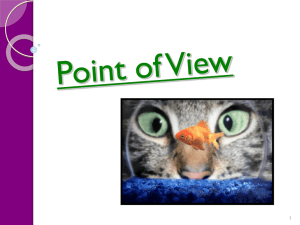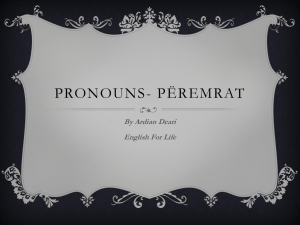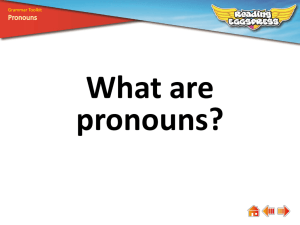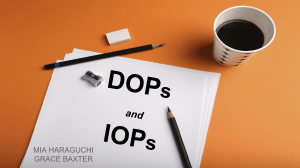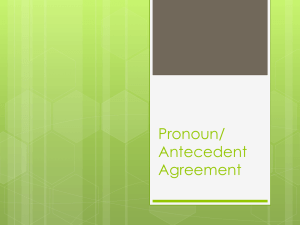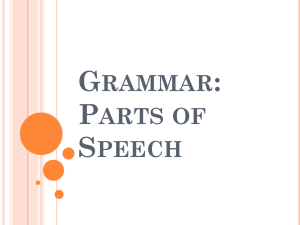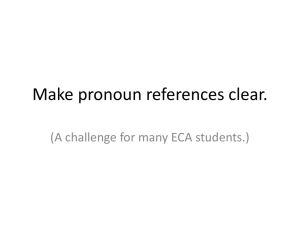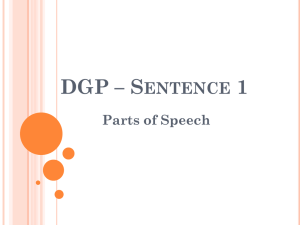Parts of Speech
advertisement
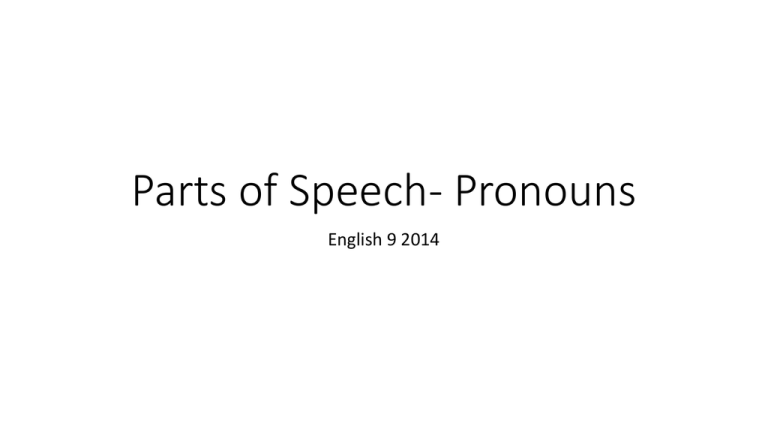
Parts of Speech- Pronouns English 9 2014 Key Concept: • Pronouns are words that stand for nouns or for words that take the place of nouns. Antecedents of Pronouns • Pronouns get their meaning from the words they stand for. • These words are called antecedents. • Antecedents are nouns (or words that take the place of nouns) for which pronouns stand. • Example: Michael said he lost his watch at the fair. (he and his are the antecedent’s for Michael). • Antecedents do not always appear before their pronouns, however. • Sometimes, an antecedent follows its pronoun. • Example: Because of its carnival, Rottweil, Germany, is my favorite city. (its is the antecedent for Rottweil, Germany). Personal Pronouns • The most common pronouns are those that you use to refer to yourself and the people and things around you. These pronouns are called personal pronouns. • Personal pronouns refer to the person speaking (first person), the person spoken to (second person), or the person, place or thing spoken about (third person). Personal Pronouns Singular Plural First Person I, me, my, mine We, us, our, ours Second Person You, your, yours You, your, yours Third Person He, him, his, she, her, hers, it, its They, them, their, theirs Reflexive and Intensive Pronouns • The ending –self or –selves can be added to some personal pronouns to form reflexive and intensive pronouns. • A reflexive pronoun ends in –self or –selves and indicates that someone or something performs an action to, for, or upon itself. • Reflexive pronouns point back to a noun or pronoun earlier in the sentence. • An intensive pronoun ends in –self or –selves and simply adds emphasis to a noun or pronoun in the same sentence. 8 Reflexive and Intensive Pronouns used in English First Person Second Person Third person Singular myself yourself Plural Ourselves Yourselves Himself, herself, itself themselves Examples: • A reflexive pronoun is essential to the meaning of a sentence. • In the following examples, identify the reflexive pronoun and the antecedent. • Joy helped herself to some turkey. • They poured themselves some milk. • An intensive pronoun on the other hand, simply adds emphasis. If you omit an intensive pronoun, the sentence will still contain the same basic information. • The mayor herself attended the carnival. • An intensive pronoun usually comes directly after its antecedent, but not always. • Frank fixed the refrigerator himself. Demonstrative, Relative and Interrogative Pronouns • Another group of pronouns can be used to direct attention, relate ideas, or ask questions. • Demonstrative pronouns direct attention to one of many different people, places or things. Singular This, that Plural These, those • Demonstrative pronouns may come before or after their antecedent. • Before: This is the person we want to hire. • After: Of all the celebrations in the world, that is my favorite. Relative Pronouns • Relative pronouns relate clauses. • A relative pronoun begins a subordinate clause and connects it to another idea in the sentence. That which who whom whose • The following sentences show the way relative pronouns are used in sentences. Independent Clause Subordinate Clause We planted a shrub that attacks ladybugs. I saw a cicada which was a surprise. Louisa is the player who pitched first. Phil is the debater whom the judges chose. We visited Grandmother whose house is in New Orleans. Interrogative Pronouns • Most relative pronouns can also be used as interrogative pronouns. • An interrogative pronoun is used to begin a question. What Five Interrogative Pronouns Which Who Whom Whose • An interrogative pronoun may or may not have a specific antecedent. In the following, only which has an antecedent. • Which of the vegetables do you want? • Who will go with me to the park? Indefinite Pronouns • Indefinite pronouns resemble interrogative pronouns in that they often lack specific antecedents. • Specific Antecedent: Some of the tourists were late. • No Specific Antecedent: Everyone ate something. • Indefinite Pronouns refer to people, places, or things, often without specifying which ones. Singular Another anybody anyone anything each either everybody everyone everything little much neither nobody no one nothing one other somebody someone something Plural Both Many Several Singular or Plural Few Other All More None Any Most Some Helping Verbs • Often, a single verb is formed from as many as four words. • Helping verbs may be added to a verb such as sung to make a verb phrase, such as had sung or should have been sung. • Helping verbs are verbs that can be added to another verb to make a single verb phrase. Recognizing Helping Verbs • Learning the forms of be and other verbs that can be used as helping verbs will help you recognize helping verbs in the sentence. • Any of the many forms of be as well as some other verbs can be used as helping verbs. Helping Verbs other than the form of be Do Does Did have has had would shall should will might must can could may Verb Phrases • Verb phrases are created by the addition of helping verbs to other verbs. The following chart lists six examples, but the possibilities are almost endless. Helping Verbs Verbs Am Did Can Will be Should have Might have been Talking Play Write Studying Seen Considered Finding Helping Verbs in Sentences • Other words may sometimes separate helping verbs from main verbs in sentences. • Words Together: They will be flying in the morning. • Words Separated: They will definitely not be going with us. Have you and the others met our friends? • The following examples show the words of a verb phrase together as well as verb phrases interrupted by other words.
